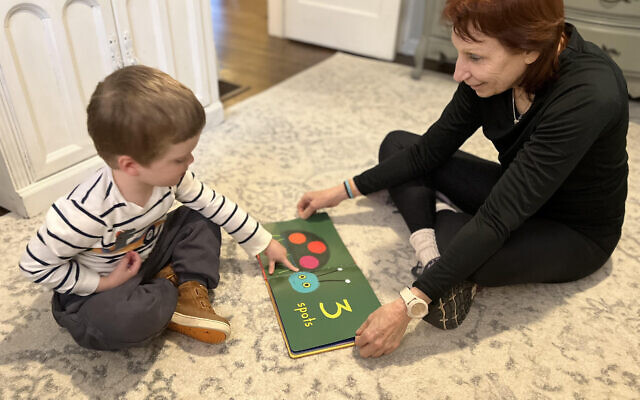Teaching Tools for Parents of Special Needs Children
In the FIRST Place offers parents resources for helping their children with special needs.
Parents of children with developmental disabilities often struggle to know how to best help their child succeed. To support parents of young children diagnosed with developmental conditions, Susan Carney, a registered nurse and clinical social worker, and Laurie Botstein, a speech-language pathologist, teamed up to start a business called In the FIRST Place that gives parents the tools to both understand and help their special needs children.
The two Jewish women connected on an Israel trip in 2011 when they realized they had been previously acquainted because Botstein had been the speech pathologist for one of the young patients in the clinical practice where Carney was working. In time, they realized that they were both certified instructors of a behavioral training approach called Floortime, in which parents are taught to help their children reach developmental milestones through play. They eventually started In the FIRST Place in 2015. FIRST stands for “Floortime Interactive Relational Social Skills Training.”
Botstein explained that, in creating the Floortime method, Stanley Greenspan, MD, a pediatric psychiatrist, and Serena Wieder, a researcher, looked at the skill levels of developmentally delayed children, including those on the autism spectrum, and matched them to the skill levels of normally developing children.
“The idea of Floortime,” said Botstein, “is for parents of children with developmental delays and autism to provide a therapeutic program on the developmental level of their child – not the chronological age of the child. What you do in Floortime is, instead of looking at how old the child is, you look at the skills that the child has achieved developmentally, and you work to get them up to being typical with their peers.”
In addition, Floortime focuses on helping children to build relationships, which Carney says is a big issue with children on the autism spectrum in particular.

“They want to, but they don’t know how. It’s one of those things that most of us learn through human nature and observation, how to interact with other people. But these children need someone to come into their world and meet them where they are. [The Floortime method] helps them to relate to other people and helps them to learn to trust other people.”
Oftentimes, what a special needs child is feeling, such as sensory overload, for example, is expressed through their behaviors, like emotional meltdowns or aggression, which can seem difficult for parents or teachers to manage.
“That’s one of our big challenges,” says Carney, “is that a lot of times they’re not able to understand their child. They don’t understand why they’re doing what they’re doing. Floortime is one of those methods that helps parents really understand their child and then to know what to do in order to help the child through whatever challenges they have at that moment.” Likewise, the program teaches the child to self-soothe, according to Botstein.
In Floortime, a parent or caregiver may participate in a play activity with their child, and then create a disruption that forces the child to adjust to a new situation.
Oftentimes, what a special needs child is feeling, such as sensory overload, for example, is expressed through their behaviors, like emotional meltdowns or aggression, which can seem difficult for parents or teachers to manage.
Sonya Khan took the Floortime workshop about five years ago with Botstein in order to better collaborate with the therapists to help her daughter, Sasha, who is on the autism spectrum and was then about six years old. Khan described how she would have afternoon tea parties with Sasha, but then change something about the activity that was unexpected. Khan says that for a child like her daughter who enjoyed living through a rigid framework, introducing these kinds of disruptions helped Sasha learn to be flexible and that change need not be scary. Part of the program is video recording the activities to receive feedback from Botstein and Carney.
Learning the Floortime method through the workshop “was immensely helpful,” said Khan. “It really gave me tools that I had confidence in [things like] here’s how to approach a challenge, here’s how to introduce something, or here’s how to set a child’s expectations for certain things. It gave me language to use, it gave me ideas and tips and tricks to use. But it also gave me an understanding of why things work a certain way since I obviously didn’t [have] the training that the therapists had. In general, it made me better parent, not just to my child on the spectrum, but to my child who is not on the spectrum.”
In the FIRST Place Floortime workshops are aimed at parents whose children are up to kindergarten age. Since COVID, Carney and Botstein have been conducting the workshops via Zoom and can ideally work with four parent couples at a time during the two-hour sessions, which are offered on the fourth Sunday of each month.
For more information, visit http://www.inthefirstplaceatlanta.com or email firstplace2015@gmail.com.
- education and camp
- Health and Wellness
- Fran Putney
- developmental disabilities
- Susan Carney
- Laurie Botstein
- speech-language pathologist
- In the FIRST Place
- Floortime
- Floortime Interactive Relational Social Skills Training
- Stanley Greenspan
- Serena Wieder
- Sonya Khan
- spectrum
- autism
- COVID
- Mental Health
- behavioral training




comments